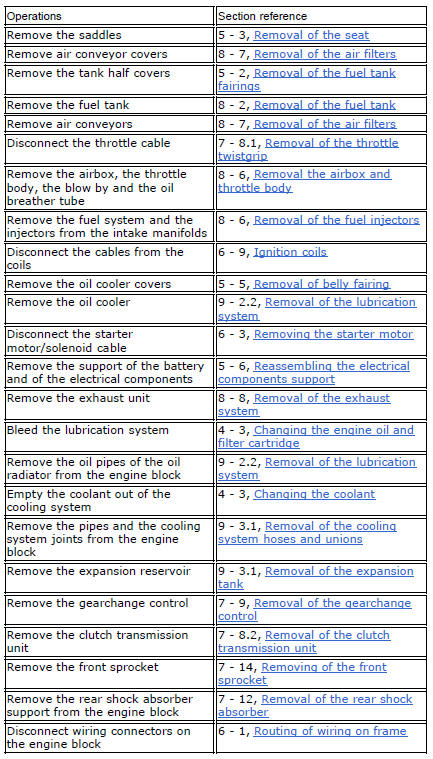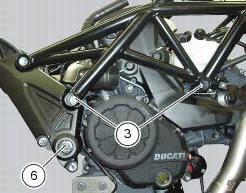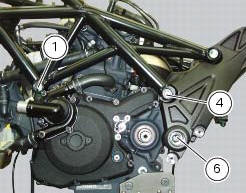
Ducati Diavel Service Manual: Removal of the engine
In order to remove engine you must first remove a series of other components from the motorcycle.
Most of these removal procedures are described in the relative sections of this manual.
The following flow chart illustrates the logical sequence in which the parts are to be removed from the motorcycle and a reference to the section where the removal procedure is described.
This section describes only the operations to be carried out after having removed all the parts listed in the flow chart.

Place a stand beneath the engine to support it during removal from the frame.
Loosen the nuts (3) on the right side of the frame, in correspondence to the engine upper supporting screws (1) and (4).
Block the special screw (6) of the swingarm shaft on the left side of the frame and at the same time undo the other special screw (6) on the right side.
Using the drift 88713.1074, Fully extract the swingarm shaft: from the lh side and recover the washer (7).
In this way the swingarm is not fixed to the engine any more, leave it connected to the frame.
Remove the upper supporting screws (1) and (4).


Withdraw the complete engine assembly from the frame by lowering it and pushing it forwards.
 Removal-refitting of the engine assembly
Removal-refitting of the engine assembly
Screw
Special screw
Nut
Screw
Swingarm pivot
Special screw
Washer
Spare parts catalogue
Diavel abs frame
Diavel abs swingarm
Diavel carbon
abs
frame
Diavel carbon
abs
swi ...
 Refitting the engine
Refitting the engine
Refitting is the reverse of removal.
Important
Apply recommended grease and tighten the special screws (6) to a torque of
60 nm +/- 5% (sect. 3 - 3, Frame torque
settings).
Tighten the nuts (3) ...
Other materials:
Removal of the crankshaft/connecting rods assembly
After separating the crankcase halves, withdraw the crankshaft (6) complete
with connecting rods (2).
...
Flexible wiring/hoses positioning
The routing of the abs wiring has been optimised to ensure the minimum
obstruction.
Each section is designed to prevent interference with parts that might damage
wires or cause operating failures when
riding.
Table a
Table b
Table c
...
Tips for use on the track
We recommend level 8 be used for a couple of full laps (to
allow the tyres to warm up) in order to get used to the
system. Then try levels 7, 6, etc., In succession until you
identify the dtc intervention level that suits you best (always
try each level for at least two laps to allow the tyres t ...